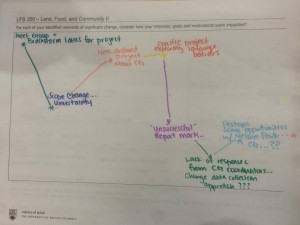A lack of responses from community garden coordinators has resulted in yet another shift in our project…
Achievements:
This week, each of our group members were able to send out e-mails and contact assigned garden coordinators in a timely fashion. We were able to get a few responses from garden coordinators regarding their application process, and a couple copies of application forms as well. While we consider this a small success, the number and rate of responses were low and underwhelming. Fortunately, we were able to connect with a garden coordinator of Nelson Park Community Gardens who sits on the Board, and also works for Statistics Canada. One of our group members, Victoria, met Francine by chance through her retail garden job. From the brief exchange, Francine expressed an interest in our project and a willingness to speak to the board of the community garden about their participation in our project. Ana then emailed Nelson Park Community Garden and got a very positive response in which they recognized their lack of resources in other languages and attached a copy of their contract. Here is part of it:
“Hello, Ana. I represent the Nelson Park Community Garden, located close behind St. Paul”s Hospital. And we do not have any of our materials in any language except English. You have given us something to think about. I do know we have gardeners who do speak other languages – and do grow plants from home cultures.”
This gave us the idea of a case study with this community garden, as they responded so positively and were so eager to help.
Objectives:
After experiencing such a low response rate from community garden coordinators, the possibility of a quantitative research project with valid data seemed to appear more grim. We decided to shift our research towards a more qualitative approach, that will analyze interviews and case studies rather than numbers for data. As a group, we must assign new roles to each member to help propel our project into a positive direction, especially after establishing yet another change so late into the term. This week, we will work on setting up interviews with select garden coordinators, and discuss possible gardens to conduct a case study.
Describe and reflect on your group’s Moment of Significant Change workshop from session 8 (include an image of the graph your group).
- Our group spirit was really high in the beginning of the project. When we were brainstorming for ideas, we realized that we shared common interests in many areas, especially in educating the public about healthy diet. Therefore, when we came up with the idea of designing a school gardening program with a cookbook, everyone was excited and ready to make a difference. (What?)
- When we realized how unfeasible our initial plan was in a small time frame, we were frustrated. This is when our motivation dropped on the graph.
- Inspired by the ABCD framework, we came to a consensus of building our project on the resources we already had. We decided to do an assessment on the existing community gardens. Our interest was regenerated during this scope change. The project was defined. We were able to narrow down our study subject to multilingual groups and aim to analyze their language barriers to the community garden.
- However, our spirit did not remain at the peak for long. The low mark we received on the proposal report was a moment of significant change. We reviewed our approaches to the assignment and identified the possible reason, such as failed to follow the rubrics for our low performance.
- Bad things never come alone. Two weeks after we reached out to the community garden coordinators through emails, when we did not receive as many responses as we thought we would. We realized that it was a moment when we needed another scope change. (So What?)
- We are planning to go forth with a qualitative research report rather than a quantitative one. We may need to set up interviews with specific community garden coordinators and participators. We will also reach out to the Richmond Food Security Society for more resources and information. Eventually we can get three different perspectives to provide inclusive evidences for our project if everything went smoothly.
- A positive response from Nelson Park Community Gardens encouraged us further to take on a qualitative research method, and sparked interest in a possible case study with them.
The Graceful Dismount (Now What)
Because of a late shift in our project, we now have even less time to complete a successful research project. We must be committed to staying very diligent on keeping our strategies and deadlines organized. An equal distribution of roles and communication between group members will be essential for success. Although we received such few and unexpected responses, this has given us valuable information and insight that will be useful in our qualitative research. We plan to interpret the lack of responses, rather than the responses themselves, in terms of accessibility to community gardens. Moreover, we plan on doing a case study research on Nelson Park, whom we got the most positive response from. Based on this, we hope to better understand challenges through a qualitative rather than quantitative approach.
